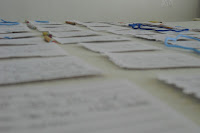 |
| New year, new resolutions . . . |
Making a vague goal means that there are no definite qualifications for reaching the goal, and when nothing is definite . . . Well, for example; if someone resolved to "be better at writing essays" without mentioning any specifics, at the end of the year they could tell themselves, "Well, I didn't get anything lower than a C on any assignments, which is better than what I did last year, so I have gotten better at writing essays!" It would be true on a technicality, but is that really the kind of improvement a goal is supposed to create?
To make big improvements, the goal should be specific and loophole-free. Using the example of wanting to improve essay writing skills, a person could resolve to "get nothing lower than a B, and earn at least two As within the year." This would be a definite goal to reach for; something a person can't explain away. It would also produce a very specific result: a better grade, and probably an array of methods that the person collected in order to earn the desired grades.
In addition to making the goals themselves specific, it would probably also be more effective for a person to make the methods of attaining them specific. One way to do that would be writing down some guidelines (tentative ideas or instructions to follow by the letter). Still going with the essay writing example, the person could write down that they're going to see a tutor by the end of February, or record their process for writing every essay in a document they'll review once they get the next assignment. The specific dates maintain a clear path to the goal, and by writing this stuff down on a calendar, it would also eliminate the problem of forgetting certain New Year's Resolutions.
And at the end of the year, one would also be able to see a list of specific accomplishments and have a definite understanding of the improvement that's been made, which would definitely be satisfying!
I haven't been very specific about my New Year's Resolutions in the past, but I'm going to try to be this time around. How about you? :)






































